
Author: Youngjin Kang Date: February 7, 2025 - March 16, 2025
The following symbolic elements are some of the most popular archetypes of play, frequently recurring in various forms of entertainment such as video games, tabletop games, films, literature, and others.

A doll is a special object. It is inanimate from a functional point of view, yet it is nevertheless endowed with the appearances of an animate being. In a way, therefore, a doll plays the role of a mediator between the realm of life (spirits) and the realm of death.
A doll is a piece of dead matter which is given its own spirit. The spirit lets the doll come alive as its own quasi-living thing. The act of fabricating a doll and giving it a name (identity), therefore, tears the boundary between the overworld and the underworld, giving birth to a "middle region" in which both the live and dead come together and establish a meaningful symbiosis. This place is an intersection between soul and matter.
Dolls can be found in a variety of forms in today's free market. A consumer good, for instance, is a doll which is imbued with the brand's spirit. Some people choose to buy goods of a specific brand because they assign metaphysical meanings to it, other than the pragmatic implication of the product's mere material composition.
Shopping, therefore, could be imagined as a process of furnishing one's own inventory of dolls - an intricate collection of enchanted icons, ready to connect the consumer's identity to the edge of reality where the distinction between the real and unreal blurs itself.
(Keywords: #PsychicInterface #Identity #Icon #Idol #Simulacrum #Toy #Plaything)

A treasure box is full of hidden wonders. The moment you open it up, it may present you with either a pleasant surprise (reward) or punishment. It is a box of mystery, and you never know what kind of thing will reveal itself until you decide to open it.
The core mechanic of a treasure box is random reward, driven by the principle of uncertainty. The act of disclosing it brings you either a good luck or bad luck, and such an outcome is determined by pure chance and not by your personal will. It is a game of randomness.
This hypothetical box shows up in different forms across a variety of cases. In the context of mining, it could be a chunk of dirt and stone beyond which precious minerals might be hidden. In the context of fishing, it could be an opaque pond in which you might be able to catch a fish. And in the context of gambling, you could imagine it as a slot machine.
In every one of the aforementioned scenarios, though, the essence of what constitutes a treasure box stays the same. It is basically an "enclosure of a secret" - a nutshell, when cracked open, throws you upon an unexpected line of destiny. And the way to open it usually involves just a simple kind of action, such as digging the ground with a pickaxe, casting a fishing rod, or pulling the lever of a slot machine.
(Keywords: #RandomReward #PleasantSurprise #Uncertainty #Probability #StochasticProcesses #ParallelUniverse)
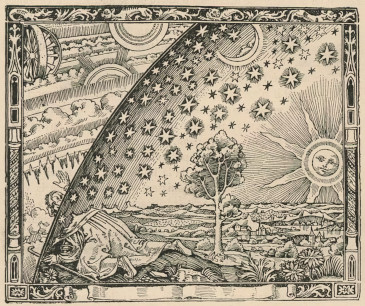
A portal is a gateway to another world - a special device of magic which lets the user "cross the threshold" to the other side of reality. It is an awkward puncture in the midst of our mundane everyday life. In literature as well as popular media, it serves as a means of scene transition.
An adventure usually begins by entering a portal, which is typically concealed in a long neglected corner of a place. It could be a door, a looking glass, a closet, an elevator, a storm, or any other "hole" in physical dimension which is capable of temporarily splitting the continuum of our living space into two binary regions - "here" (i.e. the world with which we are familiar) and "there" (i.e. the world which is unknown and full of mysteries).
By crossing a portal, one faces a major shift in one's life due to the sudden disappearance of friendly elements from one's environment. The other side of the portal presents the visitor with a whole new spectrum of paradigms, most of which defy the expectations of one's prior knowledge and education.
A portal opens up a door to a whole new space of possibilities and exploration. In a way, therefore, it provides us with inexplicable catharsis - a sense of spiritual liberation from the confines of ordinary life. In the prolonged absence of such a portal, we usually fabricate one by planning a travel, engaging in an unusual outdoor activity, or studying an unfamiliar subject.
(Keywords: #AnotherWorld #LandOfMysteries #Liberation #RoomForExploration #Adventure)

A furnace is a melting pot of chaotic rigmaroles. It is a crucible governed by primordial fire, which disassembles the well-established structure of its ingredients and concocts their inner organs into a bizarrely morphed form. It is a place of rebirth - a transformation from one state to another.
What would a furnace signify from a functional standpoint? There could be many interpretations, but one thing which is worthy of remark is that it allows multiple elements to come together and fuse into a whole separate entity. Thus, we can imagine that a furnace is a cradle of interactions and their unforeseen consequences.
One of the key takeaways of such synthesis is the very notion of unexpectedness. Familiar elements, when combined, sometimes merge into a surprising result which may either bless or destroy the creator. This queer sort of jumpscare, emerging off of the middle of one's otherwise ordinary experience, introduces a sudden "turn" in our familiar storyline, thereby reshaping the perfectly logic-driven clockwork universe into one which is interleaved with caverns of lurking chaos.
(Keywords: #Crafting #Alchemy #Mixer #Combination #Relations #Interactions)
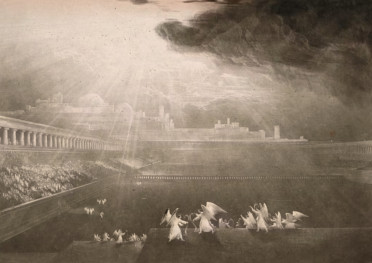
Light is an essential ingredient of visibility. We need it in order to observe our surroundings, gather information, and draw a picture of where we are and what kinds of things wait before us. Its presence ensures the overcoming of darkness - an indispensable precondition of knowledge.
It is our instinct to struggle to learn more and more about the environment in which we live. And the root of such an innate tendency can be traced back to the evolutionary fact that the more we know, the more likely we will manage to survive in this hostile world which is full of hidden dangers.
This also explains why darkness is a common element of horror in literature, as well as other forms of media such as films, games, etc. Fear originates from the unknown, and the lack of one's capacity to explain things that are happening nearby. By covering our eyes with the veil of ignorance, darkness renders us vulnerable against the phantasmagoria of potential threats.
The very moment we turn on a source of light, this chamber of uncertainty dissolves itself into oblivion and lets us surmount the unfounded fear which has been haunting us. Light, therefore, is a symbol of courage, grounded upon the promise that everything is and will stay lit in our field of vision.
(Keywords: #Unveiling #OvercomingOfDarkness #Enlightenment #Knowledge #Discovery)
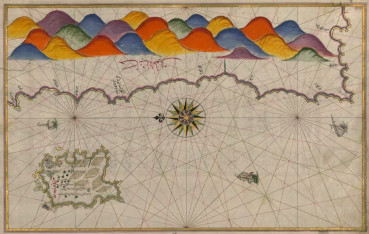
Everyone longs to discover the ultimate purpose in life. Everyone searches for a direction whenever a mist of uncertainty surrounds them. And whenever such a sentiment is being recognized, a spiritual guidance comes into play and saves the day.
A compass is what we need whenever we are lost in the thin air of motivational void. Being a direction-provider, a compass often symbolizes our hope for a parental figure who will lead us to a sequence of persistent goals as well as means to achieve them.
A compass gives us a sense of purpose - a belief that the peak of the mountain to which it is pointing is somewhere worth reaching. It gives us a reason to stay alive and continually strive to become a better version of ourselves every morning, for the hope of getting closer and closer to our ideal destination. It is what endows even the most trivial of our actions with its own meaning.
It can also be understood that a compass only provides us with a fragmentary view of a more holistic vision, which is represented by a map. A map is an overall outline (i.e. a bigger picture) of a panorama of goals that are waiting to be accomplished and how they should be approached. Since such a map can be too complex to read, however, a compass is often preferred when it comes to helping the user focus on one goal at a time, on a step-by-step basis.
(Keywords: #Purpose #Pathway #Journey #Direction #Goal #Guidance #Mentor)

A fountain is a source of life. It is the ultimate birthplace where everything comes into existence, by means of its unrestricted supply of water. Through its life-giving agency, a fountain provides the world with seeds of fertility which will eventually grow into a jungle of living matters.
Such a place of initial creation is an indispensable element to have in a narrative universe, which promises to begin its genealogy of events with its own story.
A universe, filled with its own system of meaningful causes and their correspondingly meaningful consequences, must start by telling a story at some point in time. And in order to do that, it needs to have a point of origin - the place where the hero's journey begins, the evil of the world unveils, and the ensemble of earthly matters sprout and fill up the void of space, ready to unfold their secrets before the eyes of the adventurer.
In a static, desert-like environment, we can easily imagine such a place of origin as a fountain. Once we introduce water to dry land, life starts to grow and populate its silent horizons. This is the moment at which dynamism comes into play and transforms the land into a colossal "engine" of the storyline, which henceforth drives the pangs and joys of the drama and the way they relate themselves with one another.
(Keywords: #NewLife #Spawner #Birth #NewPossibilities #Hope #NewLight)
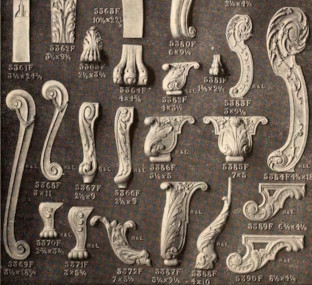
Building blocks make up the essence of our creative freedom. They are the very flesh and bones of which the landscape of our living area is made. By means of building blocks, we are able to devise all sorts of architectural wonders each of which may be imbued with its own practical and/or aesthetic features.
While the most basic building blocks are purely structural (i.e. They are static and idle objects which do not actively interact with their surroundings), we may also discover dynamic ones which are capable of displaying their own characteristic behaviors when exposed to certain conditions. An automatic door, for instance, will open itself up whenever somebody comes in front of it.
In a way, therefore, building blocks serve as the core components of the world and its dynamic system. Their particular arrangement may trigger the emergence of a series of particular events, which in turn may modify the original arrangement which triggered those events in the first place. Such a cyclic pattern of interaction signals the birth of an emergent system, which evolves over time by means of a recurring feedback loop and self-adaptation.
(Keywords: #Assembly #Construction #Emergence #Modularity #CreativeFreedom #Reductionism)
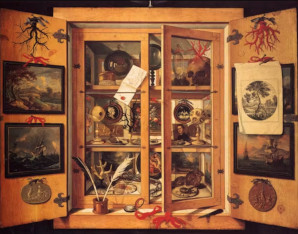
There are multiple universes in our mental landscape. As imaginative beings, we all possess "bubbles" of ideas within the deep waters of our psychic realm. Each of these bubbles is a fictional world, governed by its own laws of nature and populated by its own families of both animate and inanimate entities.
A cabinet of curiosities, which is an assortment of scientific wonders gathered from the nature, is a symbol of such a fictional universe which serves as a fuel for one's creative endeavors. As there are multiple cabinets across different rooms and buildings, a person, too, carries an entire museum of miniature universes in one's mind.
Some of these inner spheres of imagination might be collective in nature, meaning that many of us share significant portions of them as part of our culture. If you and I have read the same fantasy novel, for example, we would be sharing more or less the same world which is being depicted by that novel.
Popular media, as well as their myriad genres of entertainment, comprise a dense network of imaginary spaces, each of which possesses its own share of virtual citizens including fans, critics, and other types of audiences. Depending on how the media's narratives unfold, such spaces may freely merge, split, grow, or shrink as time passes by, as though they are celestial bodies in outerspace.
(Keywords: #CollectiveExperience #SharedUniverse #Library #Museum #ScientificInquiry #Taxonomy #CollectiveUnconscious)

From the megalithic city of Babylon to modern day metropolis, cities have been the symbol of spiritual dissonance and inner nihilism. Unlike a small neighborhood in which you are honored as an irreplaceable member of the community, a city is an unfathomably gigantic, cold, inhuman vacuum in which you will hardly find a home.
A busy metropolitan city is a center of prosperity. However, it is also a place in which individuality is utterly crushed under the weight of the populace. The city's densely populated urban areas are full of cheap, dispensable workers, constantly being told that they are nothing more than mere lines on a chart, ready to be erased the moment they are deemed useless.
Therefore, it is not hard to understand why so many forms of contemporary media, including novels, games, and films, often depict the city as the ultimate enemy of mankind in today's world.
A hero in our modern life is no longer a muscular warrior who fights in a battlefield or partakes in a journey to the wilderness. Instead, it is the kind of individual who is meek yet not afraid to build a kingdom of infinite space in the midst of this shallow, crowded world - someone who possesses a courage to stand up against the city's bloodless apathy and its callous breath to wipe everybody's dignity out of existence.
(Keywords: #Metropolis #Babylon #ModernLife #Hitchhiker #Globalism #Internet #Wired #Hyperconnectivity)

The power of a word is immeasurable. A word is a point of intersection between the material and psychic realms, serving as an interface via which feelings can be transmitted. Whenever you say a word, you are breathing a portion of your soul into that word, turning it into a carrier of a spirit.
A spirit might be thought of as a "piece of information" from a scientific standpoint. It means that we should consider a word as a volume in space which is able to be possessed by a spirit, and remain so as long as it stays legible.
By means of words, we share our spirits with those who decide to read them. And the swiftness of such a process is determined by how vividly each word depicts its corresponding spirit, as well as how compatible it is with the reader's system of thoughts.
In this sense, a computer may be imagined as a "spirit-processing machine" which inhales a stream of words (i.e. commands), rearranges their spirits according to rules established by their friends living in the motherboard's psychic ecosystem, and exhales a modified stream of words.
In popular forms of media such as video games, therefore, words are being used as basic building blocks out of which ghosts of meaning come out, reveal themselves through the silhouette of the stage's veiling curtain, and greet their audiences.
(Keywords: #Word #Language #Linguistics #Communication #Informatics #Spirit #Ghost #Interface #Medium)

A phantom is an inevitable byproduct of melancholy. It summons itself in the midst of one's illusion of hope, just to vanish all of a sudden and leave the observer dumbfounded in a cage of profound sorrow. It is the last summer night's dream, always missed but never grasped.
A phantom is usually a wicked reminder of one's foregone days which, like a late spring's cherry blossoms, had fallen down to the irreversible pit of time. They are unretrieved fragments of our missing past.
Today's media, including music videos, games, dramas, and the like, often hint the presence of such nostalgic illusion in the form of a magical enchantment, which erupts from a toybox of supernatural forces and rapidly dissolves back to thin air as soon as its charmful aura wears off.
A typical fairytale in today's world, for example, begins with a train of delightful gifts which soon get taken away at random moments in time (as though they were mere puffs of one's daydream). Images of fantastic creatures appear and disappear in irregular succession, never staying in fixed places.
In a way, therefore, phantoms reflect the inner anxiety of modern life in which people have lost their permanent identities and have become wanderers in the ocean of information superhighways. In this era of spiritual desolation, one has no choice but take refuge in glorious snapshots of one's past - those good old days back when things were simpler and had solid meanings.
(Keywords: #Fantasy #Fragmentation #Illusion #Magic #Nostalgia #Anxiety #Modernity #Urbanization #CherryBlossom)
Previous Page Next Page
© 2019-2026 ThingsPool. All rights reserved.
Privacy Policy Terms of Service